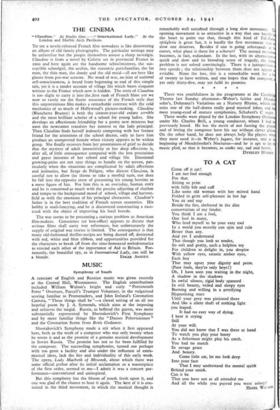THE CINEMA
"Claudine." At Studio One. international Lady." At the
London and Marble Arch Pavilions.
To see a newly-released French film nowadays is like discovering an album of old family photographs. The particular settings may be unfamiliar but the people themselves arouse a sharp nostalgia. Claudine is from a novel by Colette set in provincial France in x9oo and here again are the handsome schoolmistress, the sus- ceptible schoolgirl, the urchin, the eccentric paterfamilias, the fat man, the thin man, the dandy and the old maid—all are here like ghosts from pre-war screens. No word of war, no hint of national self-consciousness, is heard from beginning to end of this simple tale, yet it is a tender account of village life which bears eloquent witness to the France which now is hidden. The story of Claudine is too slight to carry it into the.first rank of French films yet we now so rarely see the fluent assurance of the French style that this unpretentious film makes a remarkable contrast with the cold mechanics of so much of Hollywood's picture-making. Claudine (Blanchette Brunoy) is both the sixteen-year-old enfant terrible and the most brilliant scholar of a school for young ladies. She develops an affectionate friendship for a pretty new mistress but soon the newcomer transfers her interest to the lady principal. Then Claudine finds herself jealously competing with her former friend for the attentions of the school doctor, only to have him produce an unexpected fiancee when victory appears to be within grasp. She finally recovers from her prostrations of grief to decide that the mystery of adult insensitivity to her deep affections is, after all, of little consequence compared with the less precocious and gayer interests of her school and village life. Emotional growing-pains are not easy things to handle on the screen, par- ticularly when the situations are complicated by adult affections and jealousies, but Serge de Poligny, who directs Claudine, is careful not to allow the theme to take a morbid turn, nor does he fall into the opposite error of presenting his young heroine as a mere figure of fun. For him this is an everyday, human story and he is concerned as much with the precise adjusting of rhythm and tempo to the background mood of school, village and harvest- field as with the emotions Of his 'principal characters. Claudine's father is in the best tradition of French screen eccentrics. His hobby is snail-fancying, and he is discovered constructing a race- track with the object of improving his local breeds.
The war seems to be presenting a curious problem to American film-makers. Conscience (or box-office) appears to dictate that serious films shall carry war references, but unfortunately the supply of original war stories is limited. The consequence is that many old-fashioned thriller-scripts are being dusted off, decorated with red, white and blue ribbon, and opportunities provided for the characters to break off from the time-honoured melodramatics to remind each other of the importance of Aid to Britain. For- tunately, the beautiful spy, as in International Lady, can still be


























 Previous page
Previous page